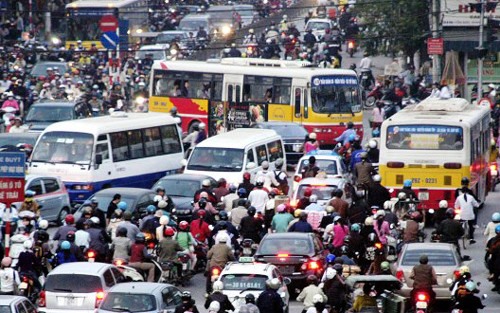 Society
Society

The rapid rise of apartment blocks along several small roads in Hà Nội has strained traffic infrastructure with thousands of new residents arriving at once.
 |
| The rapid rise of apartment blocks along several small roads in Hà Nội has strained traffic infrastructure with thousands of new residents arriving at once. — Photo vov.vn |
HÀ NỘI — The rapid rise of apartment blocks along several small roads in Hà Nội has strained traffic infrastructure with thousands of new residents arriving at once.
Trường Chinh Street in Đống Đa District has long been notorious for traffic jams, especially during peak hours. But deep down one of its many alleys, Alley 102, two major apartment blocks stand just a few dozen metres from each other. The MeCo Complex, stretching over 22,000 sq m, has nearly 500 apartments for sale since 2013. The other is the Capital Garden high-rise project planned to have 21 floors, two of which are designed to be a shopping mall.
The two apartment buildings are expected to offer new homes for approximately 3,000 people moving to the small alley which is barely wide enough for two cars side-by-side. Needless to say, the traffic infrastructure of the cramped alley, and Trường Chinh Street in general, is being put under tremendous pressure.
Another street in the neighbouring district of Thanh Xuân is also falling behind in efforts to keep up with a rising population. Triều Khúc Street, with less than 6 metres of width, is already a traffic hot spot in the capital and the situation has just got worse thanks to the arrival of hundreds of new apartments as part of the Diamond Blue and Pandora complexes.
Nguyễn Huy Tưởng Street will face similar pressure when at least three residential blocks soon open their doors for new owners.
On top of increasing worries about traffic congestion, fire safety is also a major concern.
A resident of Capital Garden, Nguyễn Văn Châu told the Kinh tế & Đô thị (Economy and Urban Affairs) newspaper that there was a big fire on the 15th floor of the building in May.
“But the problem was that the fire truck couldn’t reach the window of the apartment fire. The design of the building didn’t match the alley’s infrastructure, making access difficult for the fire engine,” he said.
Apartment buildings shooting up in the inner city are the result of a race between investors, with authorities turning a blind eye.
HCM City Real Estate Association Chairman Lê Hoàng Châu said that there was a “lack of transparency” in the licensing of such high-rise projects.
He said that several investors have been lobbying to have project licences granted even in areas unsuitable for apartment buildings or shopping malls.
“Or there were high-rise projects, though inaccessible by road or with insufficient space, that were still approved by some ‘magic’ cast by the investors,” Châu added.
“The principle of infrastructure first, construction later must be followed strictly. The authorities have to improve the infrastructure according to the city’s master plan, but at the same time, they should look into the responsibility of those granting project licences.”
“The increasing construction density is not only the fault of investors,” he said.
Việt Nam Construction Association Deputy President Phạm Sỹ Liêm said that the booming apartment blocks in the city are against basic urban planning principles.
“The Government should tighten its control on those granting construction licences or approving projects, as well as the investors,” he said. — VNS




